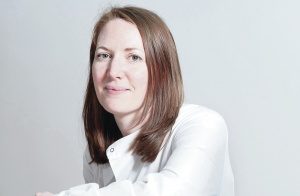Role: Research Associate – Haematology Research Group
Company: Queen’s University Belfast
Track Record: ‘You’re always learning and developing new techniques’
There are lots of rewards in undertaking research that contributes to our understanding of blood cancers. I hope that my research will eventually benefit patients with better therapies and longer survival,’ says Lisa.
What does your job entail?
I’m a post-doctoral research associate within the Haematology Research Group, which is based in the Centre for Cancer Research and Cell Biology at Queen’s University Belfast.
The aim of our group is to understand more about how and why blood cancers develop.
Blood cancers include leukaemia, lymphoma and myeloma and as a group, they are the fifth most common cancer.
People generally think of leukaemia as a children or young person’s disease, but less than 2% of cases occur in people under the age of 18.
Like most cancers, blood cancers mostly occur in the elderly, with over 75% of case occurring in people over the age of 50 years.
Unfortunately, for a lot of blood cancers, and leukaemia in particular, elderly patients are unable to tolerate the toxicity associated with most types of chemotherapy.
So my role is to try to get a better understanding of the disease and then use this knowledge to develop more effective, and less toxic, ways of treating these disorders.
My days are mostly spent in the lab carrying out experiments. I will also supervise students who are undertaking research projects to contribute to our blood cancer research as part of their courses.
What is left of the rest of my time is spent in the office analysing results, keeping up to date with current research across the globe, writing manuscripts and trying to get more grant funding to continue and expand our research.
Is it 9-5?
Not quite.
Research is never 9-5, as it will depend on how your experiments are planned and how long they take.
Some experiments have to be carried out over several days and there are only certain stages that they can be left at.
This is even to let a new drug take effect, or for an enzyme to work overnight.
Having said that, there is a degree of flexibility in terms of organising your time, but there can be times when your research means that you have to continue on into the evenings or at the weekends.
How did you get into this line of work?
I have had an interest in science from a young age, so it seemed natural to pursue a career in science, and that interest led me to going to university to study biological sciences.
During my course, I got more interested in cancer and particularly into haematology and leukaemia and that is where my career has continued.
Outline your career to date?
I went to the University of Ulster for my degree, and as part of that, I completed a training year as a biomedical scientist in a hospital laboratory at Southampton General Hospital.
After I was awarded my degree I worked for a short time in industry for a biotechnology company in Dublin, but this time I also realised that my real interest was in medical and cancer research.
When an opportunity to study for a research masters in haematology at Queen’s arose, I decided that was what I wanted to do.
As a result of that, I was lucky enough to complete a PhD and have worked in the area of leukaemia and myeloma research ever since.
Tell us about your qualifications/training.
I obtained a degree in biological sciences from the University of Ulster and an MPhil and PhD in haematology from Queen’s University.
But in this job, you are always learning and developing new techniques for your research.
What qualities are required for your job — personal and professional?
Strong communication skills, the ability to work both independently and as part of a team, motivation and determination are key qualities for this type of work.
As it can also be frustrating, your experiments don’t always give your results you want or expect, so you need to have genuine interest in the research you are undertaking.
What are the biggest challenges and rewards of the work that you are involved in?
One of the biggest and ongoing challenges for this type of work is the continual struggle to obtain funding to carry out the research.
Almost all the research in the group is funded by grants, and demand is high and competition is strong for grant funding.
In Belfast, and Northern Ireland, we are fortunate to be able to apply for core funding from a local charity — Leukaemia & Lymphoma NI — which only raises funds in Northern Ireland for research in to leukaemia, lymphoma and myeloma in Northern Ireland.
There are lots of rewards, particularly in undertaking research that contributes to our understanding of blood cancers, with the hope that my research will eventually benefit patients with better therapies and longer survival.
What do you like to do in your spare time?
Well, with an energetic toddler and another baby on the way, I have plenty to keep me busy in my spare time.
I also enjoy spending time catching up with family and friends and keeping fit through pilates and outdoor bootcamps.
Who has inspired you most in your life?
I have taken inspiration from many people in my life but my family have been my biggest influence and supporters.
But it is my daughter who reminds me that persistence and determination pays off.


